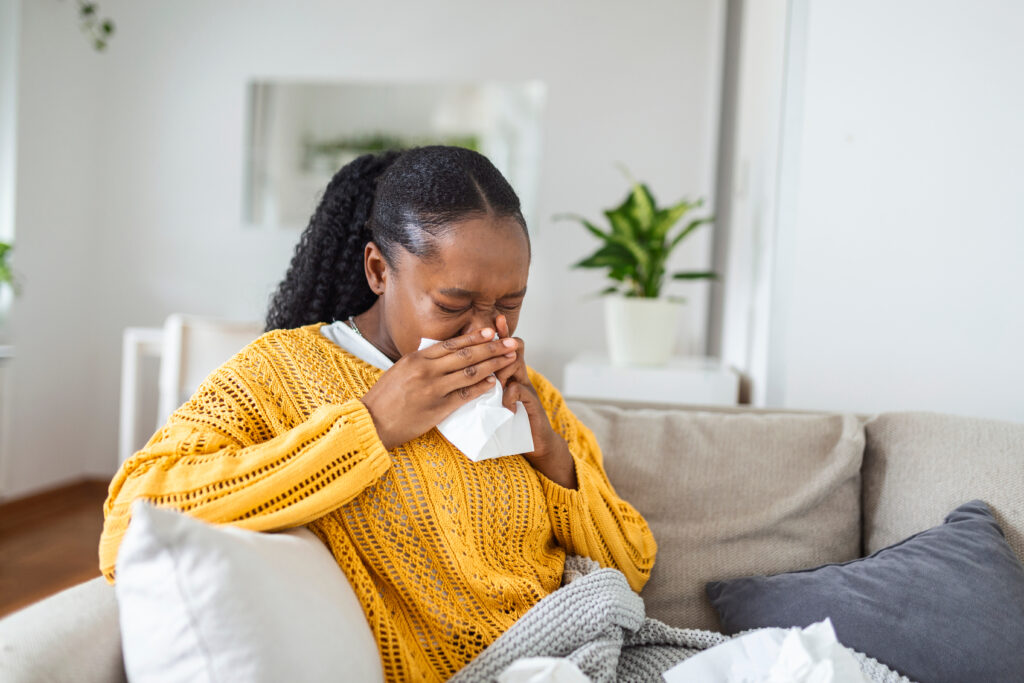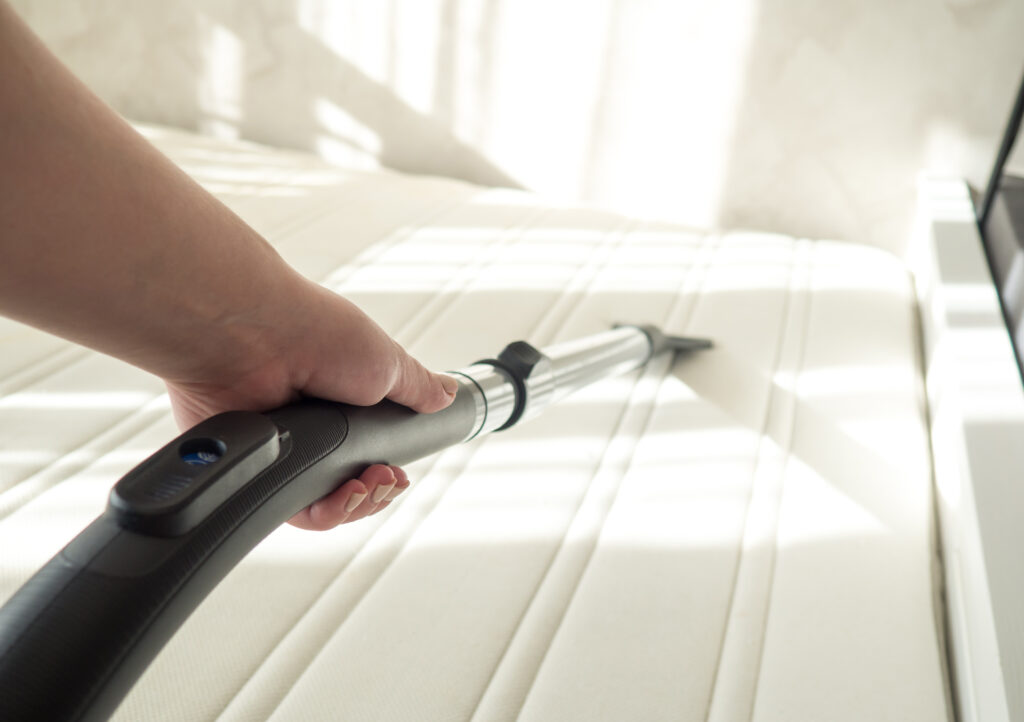August 23, 2023
Why Do I Wake Up with a Stuffy Nose?
Waking up with a stuffy nose from time to time is normal, even when you’re not sick. Certain substances you breathe in while sleeping can cause a stuffy nose, along with some underlying health issues.
A stuffy nose, also known as rhinitis, usually isn’t a cause for concern unless it lasts for several days and is accompanied by other symptoms like fever. Keep reading to learn why you may be waking up with a stuffy nose and how to request an appointment with Healthcare Associates of Texas if you think you need treatment.
7 Reasons You May Be Waking with a Stuffy Nose
Many causes of a stuffy nose are preventable. Here are the seven top reasons you may be waking up with this symptom.
1. Dust Mites
Dust mites are one of the most common allergens. They thrive easily in warm and humid places where temperatures are 70 degrees Fahrenheit or above.
Dust mites are commonly found in pillows, mattresses and carpets, and will float into the air when you move around your bedding, walk on your carpet or vacuum the bedroom. If dust mites are causing you to wake up with a stuffy nose, you may also experience symptoms, including sneezing, tearing eyes and coughing.
2. Pollen
If your morning stuffy nose occurs only during the spring and fall seasons, pollen may be the cause. Pollen counts are higher during these seasons and could enter your bedroom through open windows and air conditioning (AC) vents.
Other symptoms you may experience with seasonal allergies include sneezing, itchy throat, tearing eyes and ear congestion.
3. Mold
Mold in your home may cause you to have a stuffy nose in the morning, especially if you sleep near a bathroom. Mold can grow in any place with a lot of moisture, and even the tiniest leak under your sink or in your shower can contribute to mold. Mold could even be entering your bedroom from the outside through windows, vents and your AC system.
If your stuffy nose is being caused by mold, you may also experience wheezing and itchy eyes or skin.
4. Pet Dander
An estimated three in five households in the U.S. have pets, and over 161 million of those pets are cats and dogs that can release pet dander. The substances in cat litter may also contribute to allergy symptoms like a stuffy nose.
 Pet dander can easily stick to bedding and fabrics and tends to linger in the air for a longer time than other allergens, including dust mites. If your morning stuffy nose is being caused by pet dander, you may also experience sneezing, itching or tearing eyes, and shortness of breath.
Pet dander can easily stick to bedding and fabrics and tends to linger in the air for a longer time than other allergens, including dust mites. If your morning stuffy nose is being caused by pet dander, you may also experience sneezing, itching or tearing eyes, and shortness of breath.
5. Cigarette Smoke
Secondhand smoke contains many irritants that can damage cells in the membranes that line your nose and sinuses. This can cause you to have a stuffy nose all the time and not only in the morning.
The particles and irritants from cigarette smoke can stick to your clothing, bedding and other fabrics. Your symptoms may be worse if you live with someone who smokes indoors.
6. Gastroesophageal Reflux Disease
Also known as GERD, gastroesophageal reflux disease is a condition in which your stomach contents flow back up into your throat and nasal passages. This can cause heartburn, acid reflux, chest pain and many other symptoms — including stuffy nose.
If you have GERD, your symptoms may be worse in the morning after you wake up due to how lying down all night can interfere with the direction in which your stomach contents flow. Risk factors of GERD include obesity, pregnancy and exposure to secondhand smoke.
7. High Estrogen Levels
The hormonal changes that occur during pregnancy and menstruation can trigger a wide range of symptoms, including a stuffy nose in the morning. Estrogen is thought to play a role in the body’s mucus production, and higher levels of this hormone may cause a stuffy nose.
If higher estrogen causes you to have a stuffy nose upon waking up, your symptoms will most likely go away when your menstrual cycle starts over or after you give birth.
How To Prevent a Stuffy Nose in the Morning
The key to preventing a stuffy nose in the morning is finding out what’s causing it. Then, you can take the appropriate steps to address the root cause. For example, if cigarette smoke is causing your stuffy nose, you can work with your doctor to quit smoking or ask the smoker in your household to smoke only outside.
Here are other ways to avoid waking up with a stuffy nose:
·Minimize the amount of fabrics in your bedroom, such as curtains, carpets and upholstered furniture.
·Keep your pets out of your bedroom, including during the day.
·Bathe your pets using anti-allergen shampoos.
·Remove any cat litter boxes from your bedroom.
·Reduce the humidity level and temperature in your home.
·Wash your bedding and linens regularly.
·Use covers for pillows and mattresses that protect against dust mites and pet dander.
·Vacuum and sweep carpets and floors regularly.
·Close doors and windows on days when pollen counts are high.
·Use high-quality air filters for your AC system that reduce dust mites and pollen.
·Talk to your doctor about medications for allergies to dust, pollen and pet dander.
·Have your entire home inspected for signs of mold.
·Fix or address leaky faucets or causes of mold in your home right away.
·Elevate the head of your mattress if you have GERD.
·Avoid eating any food late at night if you have GERD.
·Ask the people in your household who smoke to smoke outdoors.
·Drink plenty of water during the day to thin your mucus and help it drain more easily.
·Take a hot shower before going to bed to breathe in its steam.
·Try eating spicy foods to open and clear your nasal passages.
When To See a Doctor
It may be time to see your doctor if your runny nose has lasted more than 10 days or if it is occurring with other serious symptoms, such as a fever. You should also make an appointment with your doctor if you are blowing blood out of your nose or yellow or green mucus. All these symptoms could indicate you have a sinus infection or a serious underlying health condition.
Request an appointment with Healthcare Associates of Texas today to receive treatment for any medical issue or symptoms, including stuffy nose. We offer a variety of primary care services, including wellness exams, screenings and more.
References
1.”Dust Allergy: Causes, Symptoms & Treatment.” ACAAI Public Website, November 7, 2022. https://acaai.org/allergies/allergic-conditions/dust-allergies/.
2.”Basic Facts about Mold and Dampness.” Centers for Disease Control and Prevention, November 14, 2022. https://www.cdc.gov/mold/faqs.htm.
3.”Pet Dander.” American Lung Association. Accessed August 14, 2023. https://www.lung.org/clean-air/at-home/indoor-air-pollutants/pet-dander.
4.”Symptoms & Causes of Ger & Gerd – Niddk.” National Institute of Diabetes and Digestive and Kidney Diseases. Accessed August 14, 2023. https://www.niddk.nih.gov/health-information/digestive-diseases/acid-reflux-ger-gerd-adults/symptoms-causes.
5.Bonds, Rana S., and Terumi Midoro-Horiuti. “Estrogen Effects in Allergy and Asthma.” Current Opinion in Allergy & Clinical Immunology 13, no. 1 (2013): 92–99. https://doi.org/10.1097/aci.0b013e32835a6dd6.
DISCLAIMER
The information featured in this site is general in nature. The site provides health information designed to complement your personal health management. It does not provide medical advice or health services and is not meant to replace professional advice or imply coverage of specific clinical services or products. The inclusion of links to other web sites does not imply any endorsement of the material on such websites.



